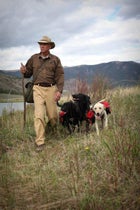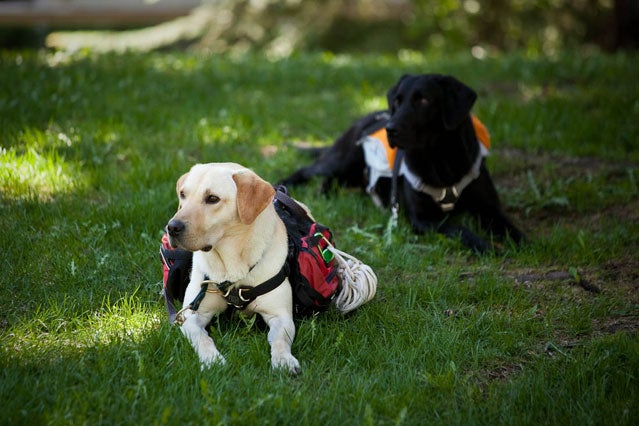Mike Stewart is the owner of , in Mississippi. He has more than 30 years experience training dogs and developed the in 2007. Stewart’s new book, , will be available from Rizzoli in September. Stewart is offering an ���ϳԹ��� Dog Clinic at on both Saturday and Sunday.
The Dog Shouter
���ϳԹ��� senior editor Grayson Schaffer’s dog, Danger, got some first-hand training from Mike in 2009.Mike Stewart
 Stewart on a hike in Colorado with the dogs
Stewart on a hike in Colorado with the dogs��
When did your interest in dogs and dog training develop?
I’ve been fiddling with different breeds of dogs for about 40 years, but my interest began when my father put me in charge of our bird dogs. He was a horse trainer, and people used to ask me, “Are you going to be a horse trainer like your father?” I said, “No, I’m going to be a dog trainer.”
Your website describes the Wildrose Way as a “unique, positive, training methodology.” How does it differ from other training methods used in the U.S.?
Our methodology evolved over the years based on positive repetition. We reward the behaviors we’re looking for, which entrenches them to the point of habit, versus trying to punish and correct the dog. My way of training is really balanced between negative reinforcement, which stops an unwanted behavior that you can’t stop any other way, and reward-based training, which captures a behavior and causes the dog to continue to repeat it. For example, if you’re on trail and your dog continues to chase elk no matter what you do, then correction is the only thing you can do to stop it. Chasing cars and running away are also behaviors that have to be stopped, or you’re going to lose the dog. You use your negative correction to stop the behavior, and the dog says, “Whoa, I don’t like that,” then you immediately replace it with a positive experience. That’s called balance in training.
Did you always train dogs this way, or did you start with another method and realize it wasn’t working?
I thought the other methods over the years were becoming far too heavy-handed. The bird dog training methods bordered on cruelty back in the old days; some terrible things were done to dogs. I thought the training methods were producing dogs that were far too tough. If you’re going to shock a dog with an electric collar all day long, you have to have a pretty tough dog, and it was actually changing the temperament of some of the retriever breeds. I opted out of that and started coming up with different, positive ways of training. I use a lot of different disciplines, not just retriever training, but I also use service dog skills and even some things you might find in a dolphin-training facility.
You mentioned service dogs. Wildrose offers training for service dogs, therapy dogs and diabetic alert dogs. How did you get involved in those particular avenues?
I was always a hunting dog trainer, and then I founded the ���ϳԹ��� Dog training program in 2007, which trains dogs in outside activities like hiking, biking, camping, canoeing and skiing. I perfected a training methodology for those types of dogs, which got me closer to other types of dogs, like search-and-rescue and avalanche dogs. A year later, a young lady who was having behavioral problems with her diabetic alert dog approached me. She asked if I would help her train her dog, and that’s what got me started. There was a lot of fraud and people selling dogs that were not up to par, and I said, “Shoot, we could help improve this program and get some quality animals out there.” It is not a profit center for Wildrose; it is a service. We do fundraising through the , and that goes into a company in Mississippi called the , which manages a fund to help people who cannot afford these animals.
You also graduated from the FBI National Academy, served in law enforcement for 25 years and were in the Navy Reserves for 20 years. Do you think your government or law enforcement training has influenced the way you run your business or handle your dogs?
Yes, quite a bit. The biggest thing that came out of my career in law enforcement and my education with the Navy was management experience. The FBI National Academy put a huge amount of emphasis on how to manage institutions and train people, and I think that’s where I got a lot of my training abilities. Training policeman helped me train people to work with dogs, and I also had a little experience with the police dogs, which I always found interesting. The Wildrose Way is unique because we bring out the natural ability of the dog and apply the controls necessary for the dog to perform in the field, on the trail or in the home. And we train people—we train the owners. Other programs basically train the dog and run competitions, but we worry more about training a dog so that we can get it to work for somebody else.��
What activities do you like to do with your own dogs in your free time?
I’m a wingshooter, so we travel the country hunting different types of game birds. I also like to do adventure-dog activities, such as riding ATVs, Jeeping, hiking trails, trail assistance, float trips, and fishing whenever I get a chance. The third thing I like to do is shows and demonstrations around the country, such as the one at ���ϳԹ��� In Aspen.��
You experienced ���ϳԹ��� In Aspen last year. What are you looking forward to this year?
���ϳԹ��� In Aspen was fun; it’s a brilliant time of year to be in Aspen. The dogs at the event are from the community, so it’s fun to see the diversity. Dogs at any level of training are welcome at the workshop. I’ll pull them straight out of the crowd, and we’ll go to a campsite, practice trail assistance, take a hike up the mountains, take a float in the lake, or do some kayaking or fly fishing. Nobody really conditions their dog to fly fishing. The first time you pop that big bug out there on the water and the fish hits it, the dog is going to jump in. It’s going to knock the fish loose and end up with a hook in its mouth. People are really spooky about getting their dog in a kayak, and it’s always really sporting to watch that particular event, if you can imagine.
, June 8-10, is a weekend filled with outfitter-led adventure, including mountain and road biking, kayaking, rafting, trail running, fly-fishing, hiking, stand-up river paddling, and rock climbing for all skill levels. The weekend also includes parties, a base camp featuring ���ϳԹ���'s Gear of the Year, a symposium with professional adventure athletes and ���ϳԹ��� personalities.


